- Canada College provides students with an opportunity to transfer to four-year universities, earn professional certificates, or improve basic academic skills. Canada is a comprehensive college that offers courses, degrees and certificates in many subject areas. The local community provides the resources that keep classes small and permit us to provide the personal touch to promote student success. We are here to serve the community�s academic and workforce training needs. Canada offers bachelor�s degrees in an array of programs through the first University Center developed in California. More than 1,000 students are on campus earning four-year degrees in nursing, business administration, allied health, child and adolescent development, art, psychology in this unique program initially funded by the California Legislature. This institution of higher learning opens doors for adult learners looking for a career change or advancement in your existing career. You can pursue a career in medical assisting, radiologic technology, multimedia, early-childhood education, fashion design, interior design, human services, accounting, business technology, and many other fields that are described on this site.
School Highlights
Canada College serves 9,782 students (9% of students are full-time).
The college's student:teacher ratio of 41:1 is higher than the state community college average of 32:1.
Minority enrollment is 76% of the student body (majority Hispanic), which is less than the state average of 77%.
Quick Stats (2025)
- Enrollment: 9,782 students
- In-state tuition: $1,452
- Out-state tuition: $8,022
- Student:teacher ratio: 41:1
- Minority enrollment: 76%
- Source: Integrated Postsecondary Education Data System (IPEDS)
School Overview
The teacher population of 240 teachers has stayed relatively flat over five years.
Canada College
(CA) Community College Avg.
Carnegie Classification
Associate's Colleges: High Transfer-High Nontraditional
Baccalaureate/Associate's Colleges: Associate's Dominant
Institution Level
Less than 2 yrs
At least 2 but less than 4 years
Institution Control
Public
Public
Total Faculty
240 staff
294 staff
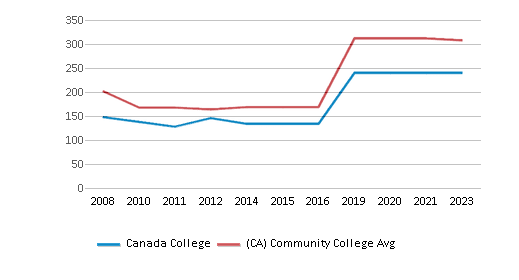
School Calendar
Student Body
The student population of Canada College has grown by 68% over five years.
The student:teacher ratio of 41:1 has increased from 22:1 over five years.
The Canada College diversity score of 0.74 is more than the state average of 0.70. The school's diversity has stayed relatively flat over five years.
Total Enrollment
9,782 students
2,311 students
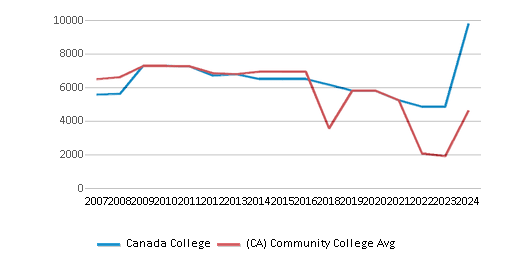
Student : Teacher Ratio
41:1
32:1
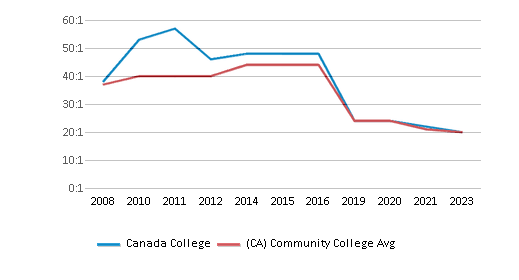
# Full-Time Students
856 students
1,232 students
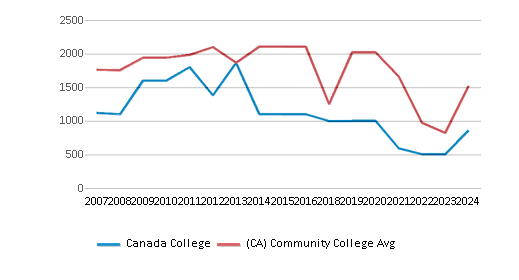
# Part-Time Students
8,926 students
8,299 students
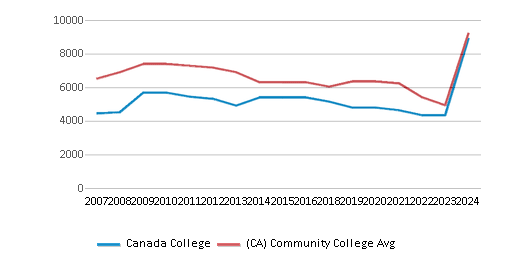
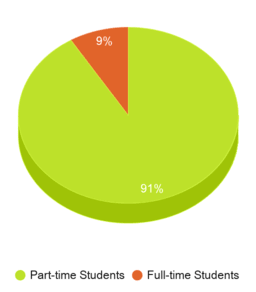
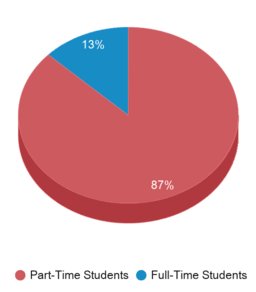
# Enrollment Undergraduate
978 students
240 students
# Full-Time Undergraduate Students
856 students
1,155 students
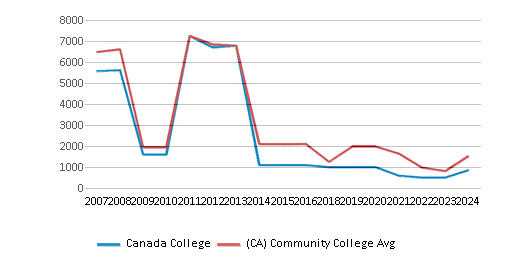
# Full-Time Graduate Students
n/a
63 students
# Part-Time Undergraduate Students
n/a
8,457 students
# Part-Time Graduate Students
n/a
10 students
Total Dormitory Capacity
n/a
140 students
% American Indian/Alaskan
n/a
n/a
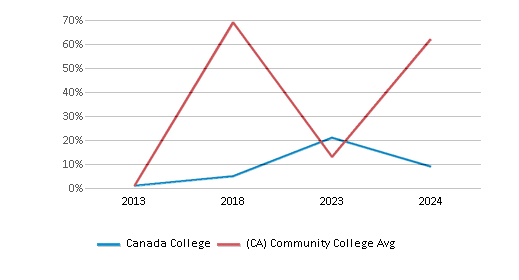
% Asian
20%
13%
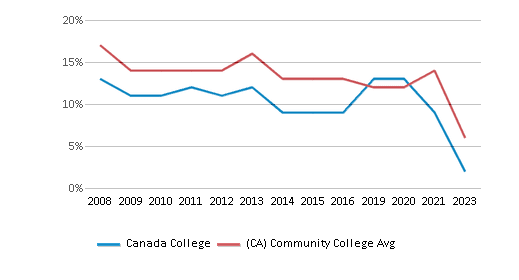
% Hispanic
40%
47%
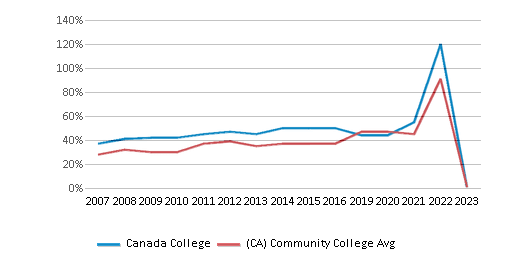
% Black
2%
7%
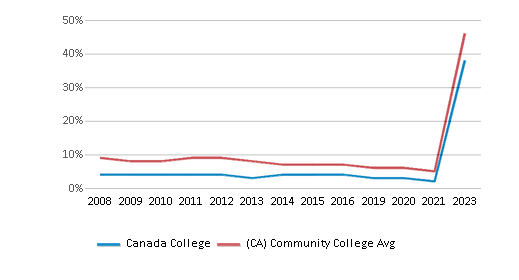
% White
24%
23%
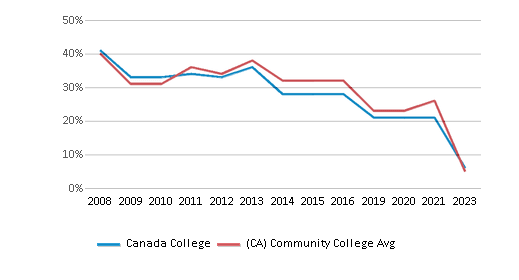
% Hawaiian
2%
1%
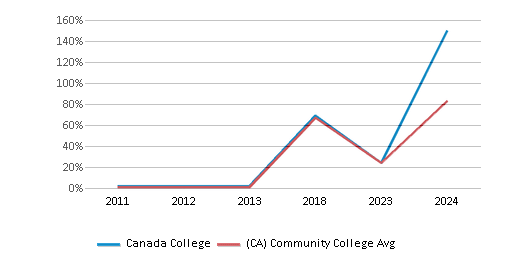
% Two or more races
6%
5%
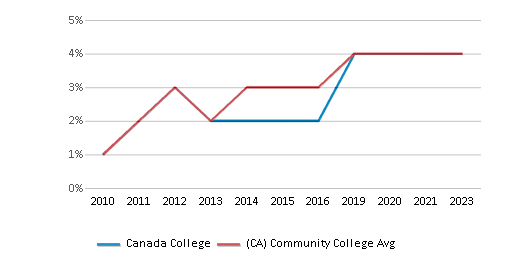
% Non Resident races
3%
1%
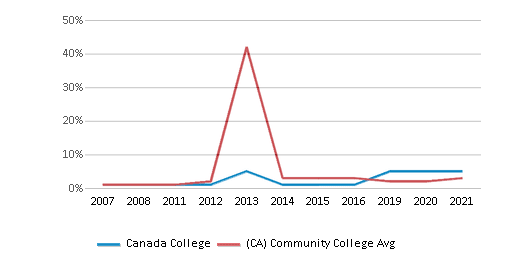
% Unknown races
4%
3%
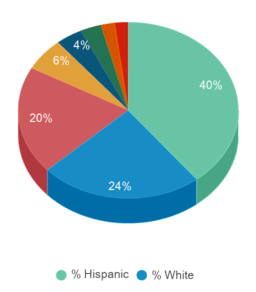
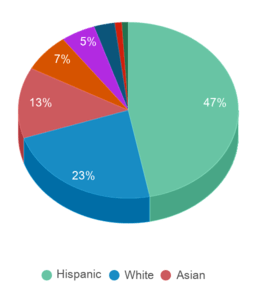
Diversity Score
0.74
0.70
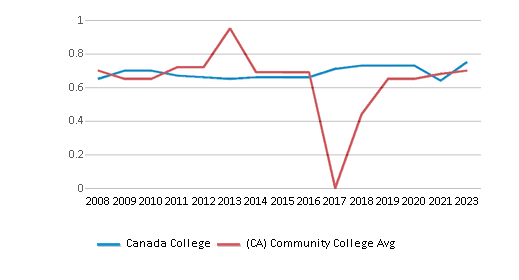
College Completion Rate (Students who graduate in less than 4 years)
0.3547%
0.4221%
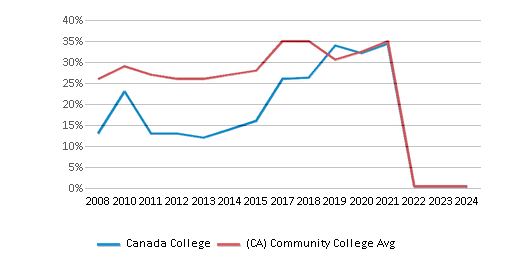
College Completion Rate (Students who graduate in 4 years or more than 4 years)
n/a
0.4304%
Average Graduate Earnings (10 Years)
$36,800
$34,700
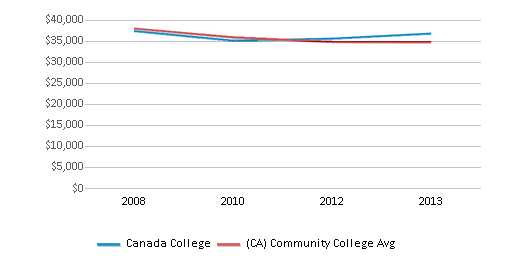
Tuition and Acceptance Rate
The public in-state tuition of $1,452 is more than the state average of $1,236. The in-state tuition has grown by 6% over four years.
The public out-state tuition of $8,022 is more than the state average of $6,547. The out-state tuition has declined by 10% over four years.
In-State Tuition Fees
$1,452
$1,236
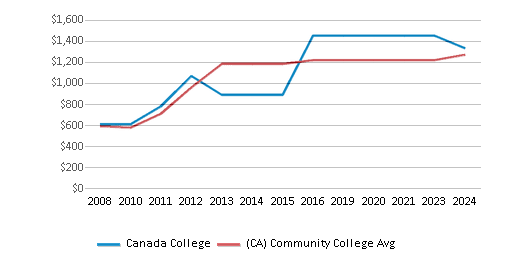
Out-State Tuition Fees
$8,022
$6,547
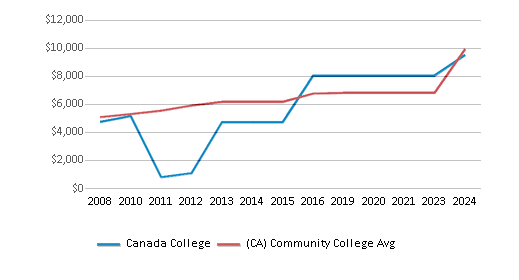
Tuition Notes
N/R Tuition - $191.0
% Students Receiving Some Financial Aid
68%
85%
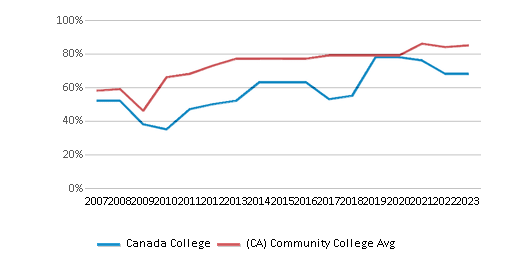
Median Debt for Graduates
$18,660
$10,500
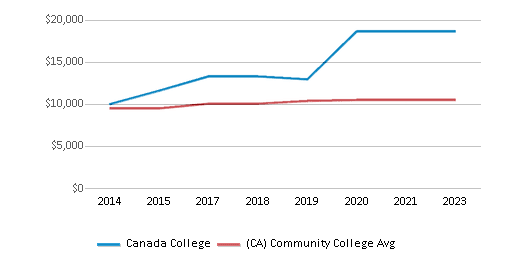
Median Debt for Dropouts
$7,000
$6,239
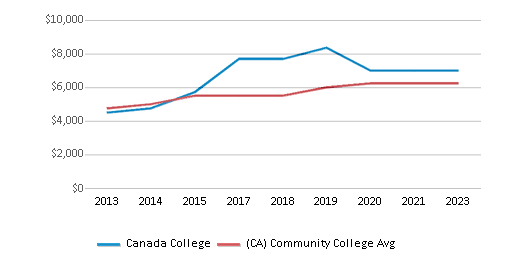
Acceptance Rate
n/a
92%
Source: 2024 (or latest year available) Integrated Postsecondary Education Data System (IPEDS)
School Notes
- Ca�ada College opened in 1968 as part of the three-school San Mateo County Community College District. The college is located on 131 acres in the western part of Redwood City and is conveniently located to Highway 280. The primary service area for the college is the southern portion of San Mateo County, Redwood City, East Palo Alto, Menlo Park, San Carlos, Atherton, Portola Valley, La Honda, Woodside, Half Moon Bay, and Pescadero. Ca�ada College is part of the 108 school California Community College system. Ca�ada College is one of the smallest community colleges in the Bay Area with approximately 6,500 students. The college is one of only two federally-designated Hispanic Serving Institutions in the Bay Area. Approximately 44 percent of Ca�ada's students are Latino. Ca�ada College is one of the few California community colleges offering bachelor's degrees through its University Center. Whether your goal is to complete high school, earn a professional certificate, associate's degree, or to eventually transfer to a four-year college or university, Ca�ada College is here to help you. We offer a seamless learning environment that can take you from high school to a university degree without ever leaving our campus. Ca�ada College also opens doors for adult learners looking for a career change. You can pursue a career in medical assisting, radiology, multimedia, early childhood education, fashion and interior design, human services, accounting, business technology, and many other fields that are described through our webpage. Whether you need to start your new career by first learning English or you already have a bachelor's degree, Ca�ada College can help you on the path to a new career.
Frequently Asked Questions
How much does Canada College cost?
Canada College's tuition is approximately $1,452 for In-State students and $8,022 for Out-State students.
Recent Articles

How To Craft the Perfect College Admissions Essay
Read on to learn the ins and outs of crafting the perfect college application essay.

Obtaining Your Bachelor's Degree at a Community College
Explore the evolving landscape of community colleges offering bachelor's degrees, addressing affordability, accessibility, and workforce needs.

A to Z of Community College Certificates and Courses
From business and healthcare to technology and skilled trades, the article showcases the breadth of options available to students seeking to enhance their knowledge, develop new skills, or pursue career advancement.



![Good News ! Students from Quebec Colleges will Get Visa Results Very Soon . With Canada College and Herzing College getting official letters from Ministry of Higher Education Canada has clearly stated that students who are interested in studying in these colleges can actually go ahead with their Visa Files and IRCC will process all the files and give result by 6th August . Watch full details in this video**************************************************************************************************************************************************************************
Facebook : Fb.com/CheckCheckJohnyHans
Instagram : Instagram.com/CheckCheckJohnyHans
Twitter : Twitter.com/checkcheckjohny***************************************************************************Click form link to apply for Kensley College or any College or Courses :https://docs.google.com/forms/d/e/1FAIpQLSexD6R2xOULAH4o8KpiBarRm52wCuHQ5OtHGLRnTi_pIRZuwQ/viewform?usp=pp_urlEmail: apply@checkcheckservices.com
website : checkcheckservices.com*****************************************************************************Also check out more video in my channelTop 7 Best Courses In Canada 2021 https://youtu.be/bzPLX9R3paE???????????[100% working] 5 TIPS TO GET CANADA VISA https://youtu.be/_onn7RCojQw???????????5 Ways of Coming to Canada Easily https://youtu.be/lUqgKQz_l2I???????????High Paying Truck Jobs in Canada https://youtu.be/aAe75A9Hj98???????????Best Colleges and Courses for Canada Student Visa in 2021 https://youtu.be/ZpFzZBTJe1E???????????
Convert Tourist Visa to Work Visa https://youtu.be/HVXdfO8IIRQ???????????Get Cash to Buy Trucks and Trailers in Canada https://youtu.be/y8_pvtxscoc???????????Why Canada Student Visas Get Rejected https://youtu.be/qrVwKei-ox0???????????High Paying Jobs for Students in Montreal https://youtu.be/vba06LYkoZo???????????How to get Truck License In Canada | Process Fully Explained https://youtu.be/zppLRFlNjUE???????????How to Get Canadian Citizenship https://y Good News ! Students from Quebec Canada Colleges will Get Study Visa Now](https://i.ytimg.com/vi/XgeAepsnfk8/0.jpg)





